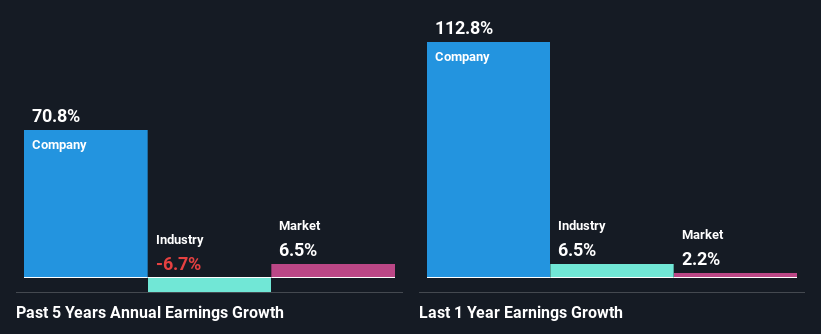
Meitu's (HKG:1357) stock is up by a considerable 24% over the past three months. Given the company's impressive performance, we decided to study its financial indicators more closely as a company's financial health over the long-term usually dictates market outcomes. In this article, we decided to focus on Meitu's ROE.
Return on Equity or ROE is a test of how effectively a company is growing its value and managing investors’ money. Put another way, it reveals the company's success at turning shareholder investments into profits.
Our free stock report includes 3 warning signs investors should be aware of before investing in Meitu. Read for free now.How Is ROE Calculated?
ROE can be calculated by using the formula:
Return on Equity = Net Profit (from continuing operations) ÷ Shareholders' Equity
So, based on the above formula, the ROE for Meitu is:
16% = CN¥806m ÷ CN¥5.0b (Based on the trailing twelve months to December 2024).
The 'return' is the yearly profit. So, this means that for every HK$1 of its shareholder's investments, the company generates a profit of HK$0.16.
View our latest analysis for Meitu
Why Is ROE Important For Earnings Growth?
Thus far, we have learned that ROE measures how efficiently a company is generating its profits. Depending on how much of these profits the company reinvests or "retains", and how effectively it does so, we are then able to assess a company’s earnings growth potential. Assuming everything else remains unchanged, the higher the ROE and profit retention, the higher the growth rate of a company compared to companies that don't necessarily bear these characteristics.
Meitu's Earnings Growth And 16% ROE
To start with, Meitu's ROE looks acceptable. Especially when compared to the industry average of 7.6% the company's ROE looks pretty impressive. This certainly adds some context to Meitu's exceptional 71% net income growth seen over the past five years. We reckon that there could also be other factors at play here. For instance, the company has a low payout ratio or is being managed efficiently.
Next, on comparing with the industry net income growth, we found that the growth figure reported by Meitu compares quite favourably to the industry average, which shows a decline of 6.7% over the last few years.

Earnings growth is a huge factor in stock valuation. The investor should try to establish if the expected growth or decline in earnings, whichever the case may be, is priced in. This then helps them determine if the stock is placed for a bright or bleak future. Is 1357 fairly valued? This infographic on the company's intrinsic value has everything you need to know.
Is Meitu Efficiently Re-investing Its Profits?
Meitu's three-year median payout ratio is a pretty moderate 29%, meaning the company retains 71% of its income. By the looks of it, the dividend is well covered and Meitu is reinvesting its profits efficiently as evidenced by its exceptional growth which we discussed above.
While Meitu has seen growth in its earnings, it only recently started to pay a dividend. It is most likely that the company decided to impress new and existing shareholders with a dividend. Upon studying the latest analysts' consensus data, we found that the company's future payout ratio is expected to rise to 39% over the next three years. However, the company's ROE is not expected to change by much despite the higher expected payout ratio.
Summary
On the whole, we feel that Meitu's performance has been quite good. In particular, it's great to see that the company is investing heavily into its business and along with a high rate of return, that has resulted in a sizeable growth in its earnings. That being so, a study of the latest analyst forecasts show that the company is expected to see a slowdown in its future earnings growth. To know more about the company's future earnings growth forecasts take a look at this free report on analyst forecasts for the company to find out more.
Have feedback on this article? Concerned about the content? Get in touch with us directly. Alternatively, email editorial-team (at) simplywallst.com.
This article by Simply Wall St is general in nature. We provide commentary based on historical data and analyst forecasts only using an unbiased methodology and our articles are not intended to be financial advice. It does not constitute a recommendation to buy or sell any stock, and does not take account of your objectives, or your financial situation. We aim to bring you long-term focused analysis driven by fundamental data. Note that our analysis may not factor in the latest price-sensitive company announcements or qualitative material. Simply Wall St has no position in any stocks mentioned.